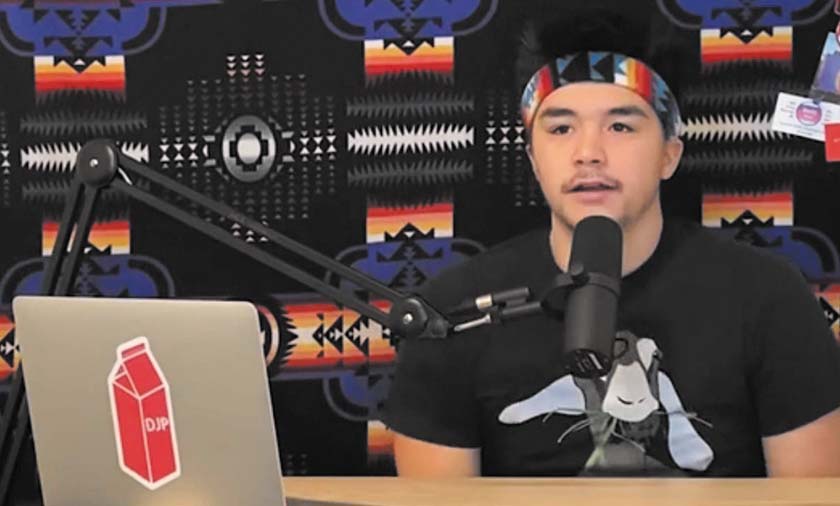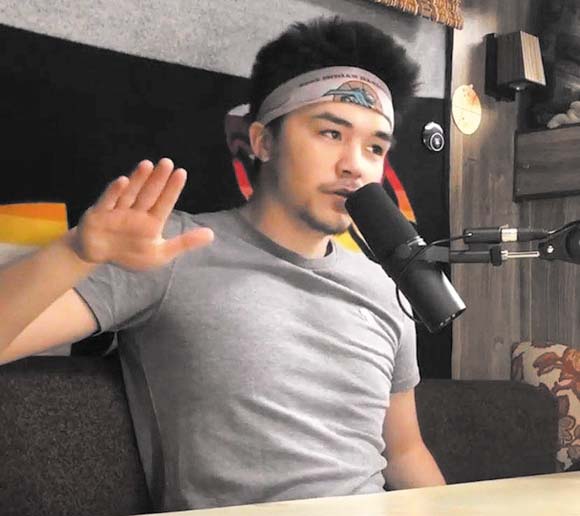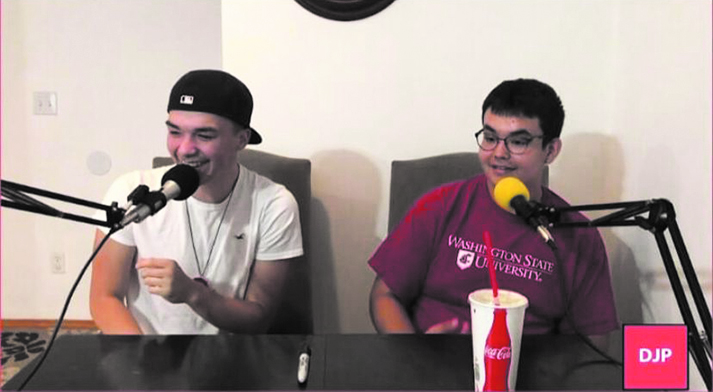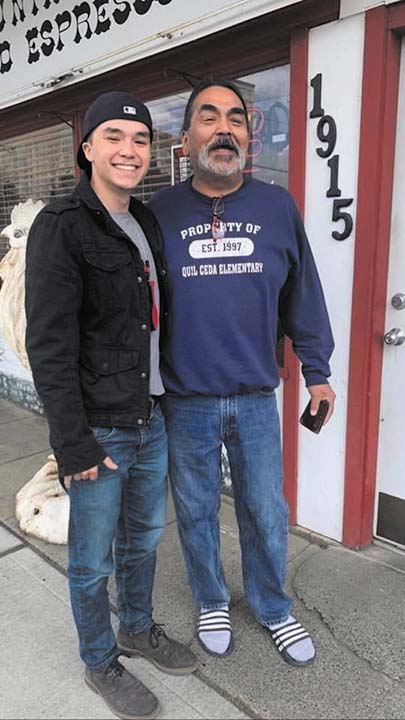
By Kalvin Valdillez; photos courtesy of Dom Joseph
The gift of gab is a skill, a highly coveted technique that has been perfected over time by the Indigenous Nations of America, who have historically shared the knowledge of their people, by means of oral tradition, to each passing generation. Years upon years, tribes have utilized the art of storytelling to convey important life lessons such as minding your elders, taking care of Mother Earth, and hunting, fishing and foraging for nuts, berries and medicinal plants. Not to mention intertribal ceremonies like namegivings, powwows, potlatches, canoe journey, as well as many other lifetime achievements and celebrations. Stories are an integral piece to the Coast Salish culture, which each new generation continues to builds upon, keeping the traditions and lifeways of the people strong and alive for years to come.
During a modern era where information and technology seem more disposable than ever, Native communities are finding new methods to highlight their way of life and are exploring new ideas to document their stories, that otherwise would have been handed down vocally to a select few. The presence and access to a tool such as the internet, allows the word of the tribe to reach the masses. Anyone inquiring about the culture of a specific tribe are essentially just a few clicks away from learning about that Nation’s true history – of the treaties, the relocation, boarding schools, traditional diets, and in some cases even the ancestral languages and songs are accessible to those who are looking. And what makes it even more exciting is that information is often put out directly from the source today, and isn’t heavily relied upon one-sided history textbooks and ill-informed school districts as it once was.
Tulalip tribal member Dominick (Dom) Joseph’s passion for this traditional skill has led him to the forefront of a new movement that is taking the internet, and therefore the world, by storm. The media format of podcasting has been gaining momentum since the late aughts and has blossomed over the past decade. More and more people are catering to their niche fanbases by creating their very-own platforms to discuss topics that are nearest and dearest to their hearts, whether that stems from a love of music, movies, current world events, self-help, or even exhilarating true crime stories.
Dom has a strong love for his people, his culture and rez comedy which he effortlessly showcases on-air. His unique journey with storytelling and podcasting perfectly displays his adoration and pride for his tribe, his family and his cultural lifeways. When he speaks, he uses his good-natured humor to open up about issues that he is working through, as a young Native college student experiencing life off the reservation for the very first time. The aptly self-titled project, officially known as the Dom Joseph Podcast, provides a space where other Natives can relate, gain perspective, and join-in on a good old-fashion laugh-your-ass-off session with a natural emcee who shares his unfiltered thoughts, jokes and stories on a weekly-basis. His podcast continues to gain momentum as each day passes, and more youth, elders and everyone in between are tuning-in to find out what the Dom Joseph Podcast, often referred to as the DJP, is all about.
Tulalip News: Why don’t we just dive right in? Let’s talk about your background and who your family is.
I’m Dom Joseph; I’m Tulalip. I have one little brother, Lukas Williams. My mom is Chena Joseph and my grandpa is Kenneth Joseph.
What led you to podcasting?
My background really came from editing. I went to Marysville-Getchell and I went to Tulalip Heritage. I started editing at a young age, making funny videos. I started getting into podcasting about three-and-a-half years ago. It all kind of started when me and my grandpa would meet every week and we would talk about football. He’d call and say, “alright grandson, who do you think is going to win?” and we’d sit on the phone for about 20 minutes every week. I thought why don’t I turn this into a podcast, so I can be prepared to talk my grandpa every week. And so, I started my first podcast, which was called ‘Weekly Take’, about three years ago, and that was all sports related. I ran that for about a year and I started really falling in love with the whole process of podcasting. I liked having something to be creative about every week.
It wasn’t until one of my family members was like, “I love your podcast, but I don’t really listen to sports.” I thought, Oh yeah, I guess some people don’t really listen to sports. So, I decided to start another one.

Who are some of your inspirations in the podcasting world today?
Joe Rogan. Theo Vaughn. A lot of the comedians in L.A. who have their own podcast, I think are hilarious. I’ve gotten to actually do some work for Joe Rogan and Theo Vaughn in an internship in L.A. I’ve been doing that remotely because of COVID.
When you were first starting out, did you have an idea of what the Dom Joseph Podcast would be, or a direction in which you wanted to take it?
You know it’s funny, I sat there for about two days thinking about a name. I was like, ‘man, I can’t think of a good name or a logo.’ Eventually I just said, why don’t I make it my name, something easy and then the logo will be my favorite color, which is red, and we’ll just go from there. And ever since then, it’s just been the Dom Joseph Podcast.
You have a pretty awesome backdrop in your videos, is that a Pendleton blanket?
Okay, so the first episode, I didn’t even have video. And then the next episode, it was just my face. And then finally I was like, why don’t I put a Pendleton behind me? But I had the fisherman Pendleton, and that’s the Puyallup designed one. But I’m not Puyallup, I’m Tulalip. I get how that could be a little confusing, so then I had a Tulalip flag up for one episode. When I came back home, my mom was like, “hey, that’s mine.” So, I didn’t get to take that one back home to Pullman, where I go to school and I record at. Eventually I was like, why don’t I just get a blanket that I know everyone has? The latest one behind me, I think I got at a powwow, it’s like the ones sold at Billy’s Blankets in Tulalip.
And so, I went with that blanket because more people have that one, and I thought it was kind of cute. If a little kid wanted to make their version of the Dom Joseph Podcast, I know they have that blanket at home and they could just put that behind them and make something fun. And I also just thought it was funny, it looks like I’m getting a photo taken for a tribal ID.
Were there certain stories that you initially wanted to talk about?
Growing up I’d hear crazy stories about my cousins all the time. Through word of mouth or at basketball tournaments and canoe journeys, just laughs and crazy experiences my cousins lived through. I thought, why don’t I do something like that for my little cousins to have? Maybe if – say I’m out doing something away from home or I pass away, they at least have that piece of me, of my memories to listen to. I think that’s really important, especially as Native people, to have a story we can to listen to and relate to.
So, what you’re doing is, in a sense, traditional. It’s storytelling! That’s how we shared and passed on knowledge through the generations. And now you’re doing that for the future generations through podcasting.
Yeah! You know, the storytelling aspect didn’t really hit me until the middle of the podcasts. I was like, ‘Man, this is actually storytelling.’ I’m out here telling jokes and discussing what I’m going through. And that’s how people learn right? Through the experiences of other people.
Not a lot of us go to school. I mean, the statistic of Native Americans who go to school isn’t really that big compared to much other [ethnicities]. If I could story-tell and just kind of make it sound fun, or make the college lifestyle sound great, that’s important messaging for me, for us. That’s a big part of it, especially for other tribal members. The whole podcast is me – I’m Tulalip and grew up on the rez, so it’s going to sound Native. A lot of people think that I’m pigeonholing myself down to just be the Native guy. Dude, that’s who I am. That’s not a problem for me. Storytelling is a big aspect of my podcast and it’s something that I’m proud to do.
What are some topics that you’ve discussed so far, that you really enjoyed talking about? And what do you wish to talk more about in the future?
Basically, the topics just kind of come up. It’s about what people are going through. For instance, I just had Jared Parks on and he shared about his kettle corn experience, about my little cousin and autism awareness. My favorite thing is to share everyone’s experiences.
Other topics I’d like to talk about are whatever makes people laugh. I haven’t really touched upon the culture or tradition as much as I would like to, so eventually, I’d like to delve more into that. One of the next guests I want to have on is my grandpa. But with elders, I want to make sure it’s a comfortable conversation. I don’t want it to sound forced, I want us both to be comfortable. I really want to have him on just to talk and hear about what it was like at Tulalip back then. Like the stories I used to hear when he’d tell me, ‘grandson, that Admin building wasn’t even there before’ or ‘Boom City used to be on the water.’ Some in-depth stories like that would be really cool to touch upon.
You are essentially bridging the gap between generations, that’s super important in today’s fast-paced society. What are some other reasons you believe hosting a weekly podcast is important?
I think it’s important just for myself, it keeps me busy. I keep myself busy in other ways too, through sports or Xbox or hanging out with friends. But having a creative outlet is really good too. A lot of people have different creative outlets such as making drums or going to sing, I feel like this is a really good outlet for me because I was used to it – I was used to being on my computer and editing around all the time. So, if I was doing it for all these other people and providing value for them, why couldn’t I do it for myself?
For kids just starting out, who want to explore podcasting and use it as a creative outlet, can you talk about some of the equipment that is needed to get started?
I’m actually in the process of making a total course on how to do it, and I’m not going to charge for it, I’m just going to post it. But what kids should do first is just record themselves on their phone. That’s where you can really start, that’s what I started with. But if you want to get into it more, you’ll need a mic, you’ll need a computer, and something that connects your mic to the computer. You can record it on software such as Audacity, or GarageBand if you have a MacBook. There’s a lot of recording software you can use but really all you need is a mic, a computer and the internet.
And this is where I get a lot of questions. I upload it to Soundcloud and when you go to Soundcloud and you upgrade to Soundcloud Pro, you can get an RSS feed. And when you get that RSS feed, that’s how you can feed it to other platforms such as Apple Podcast or Spotify. But having an RSS feed is pretty key if you want to post it to other platforms.

Yeah, I actually heard the DJP on Spotify before I saw any footage.
Spotify is probably my favorite platform that it gets posted to. That and YouTube, because YouTube is video. But yeah, Spotify is definitely my favorite platform because I could see a lot of the analytics easier.
You mentioned your episode with former Tulalip BOD Jared Parks, have you had other Tribal members featured on the pod?
Yeah, I’ve had Darion Joseph on. I’ve had Breland Joseph on. I’ve had my brother on. I’ve had my girlfriend, she’s from Tuscarora. I’ve had my buddies from Yakima on. So yeah, I’ve actually had quite a few Native Americans on the podcast. And I kind of want to keep that key. I’ve also had almost every race of people on there, and I think that’s what makes it open. I want anyone on who wants to come and share.
One of my guests, I met at a sweat. It was my girlfriend’s uncle’s brother, and he was telling me he is comedian. And I was like, let’s record this conversation and it just started from there. You know, we meet people every week and we don’t know whether that person is going to be in our life for that moment, another week or another year. I think if I’m able to capture that conversation for other people to hear, and get insight or experience from, I think that’s really important.
You have a rising listenership forming locally at Tulalip. People on Instagram and Facebook share your podcasts to their stories and timelines regularly. Where do you see the DJP taking you and how do you plan to continue to grow your audience?
My five-year goal is to stay consistent and see where it takes me from there. I see a lot of these successful podcasters right now, in Native America and also the L.A. comedy scene. I keep referring to them because that’s where I’ve been working, just seeing how they’re getting sponsors, or how they book really cool guests. That’s the most important thing, I want to have a platform where I can communicate with cool people, some of my biggest inspirations. And maybe eventually get on their podcast and have conversation. I want to be a voice for Tulalip, that’s a big key for me.
Do you have a certain ritual or anything that you must do before you record the podcast?
Kind of. Every week is different. I wish I had a quirky thing or ritual I did beforehand like eat a lemon or something. But sometimes just getting in front of the mic is the ritual, just to get into that mode as soon as the camera’s on.
What days are the episodes typically released?
I like to release them on Sundays or Mondays. That’s usually the time people don’t really have class. I like to have them recorded by Wednesday or Thursday, and that’s usually the solo episodes. People enjoy the solo episodes because it’s just me, but a lot of people like to also hear from guests. I like to think I’m kind of interesting, but sometimes if you’re listening to me for four episodes in a row, I get how it could be refreshing to hear from others. Like, who’s Dom talking to this week?
For our readers who have yet to check out the DJP, do have any episode recommendations to start with?
Oh, my goodness. That is a very good question. Yes, actually. If I were to recommend any, my little brother’s episode is a really good one, which is titled Lukas Williams 2, Dom Joseph Podcast episode 51. We made this big bracket of animals and we put them against each other, like a March Madness bracket. And the bracket wasn’t necessarily the interesting thing, it was more of the chemistry me and my brother have. And I’ve had some episodes where I have people on and I don’t really mix well with them and that’s okay too.
Another good one was Powwow Judge, episode 65. They get better as they go. And then I believe Powwow Menus is also a good one, which is Episode 77. And then Movie Pondering, which is 76. They’re all pretty good but those ones come to mind.
Right on. I have a feeling a lot of our followers are going to go through and binge a few episodes now.
If people start from the middle, that’s okay. It’s not like a series. I made it so you don’t have to listen to every one sequentially, in order.
Do you see the Native market for podcasting growing in time as well? Do you see other tribal members expressing themselves through the art of podcasts in the near future?
Oh yes, of course. I actually think I heard this in high school, but we were the first people ever to get our pictures taken. The first camera was used by some guy who went to a reservation and took pictures of Native Americans. I think this podcasting platform, for all Natives, is a really big thing that’s going on. I think it’s only going to get bigger. I think eventually, it’s going to get to a point where some individual is going to create a platform that is strictly for Native podcasting. Personally, I think we’re the greatest type of people to do it and I think we deserve to get our voices out there. I believe a lot of Native Americans, especially Tulalips, could story-tell for days and they can make you laugh through it, they can make you cry through it. I definitely do see a lot of Native Americans in podcasting.
It is definitely exciting and filled with possibilities. What fuels your passion for this new form of media?
Mainly, I’m happy with where it is right now with just for my family to hear. As long as I never lose that fun part of it, I’m going to keep doing it. And I think anyone who likes to story-tell should definitely get into podcasting, because it’s a really fun thing to do and everybody has something they could share.
Right now, I don’t have the degrees, the reputations, the following that I would like to be at, but that comes through consistency and contributing my time. That’s what’s going to get me to the end goal, which is to have our people here.
There’s a lot of focus going into mental health today. And of course, as Natives, we deal with generational trauma and work on trying to break those cycles. Do you think that podcasting could help us work through some of that, by talking things out and gaining perspective from others?
When I first started DJP, it kind of started from a place of – I needed to talk to someone. And to be honest it was a hard breakup, that’s what it was. I didn’t know who to talk to. So, I started reaching out. It was a little bit more comfortable for me to talk into a mic than to go meet a total stranger from somewhere I wasn’t from, because I wasn’t home at the time. If I were to recommend anything, I would recommend doing a podcast because it does definitely help with that. But seeing a professional also helped me.
I think podcasting does help with mental health though. It’s something that I can go and talk to for forty-five minutes. Some people talk to their journals and they write for thirty minutes. Me, I kind of go in and vent. And sometimes there are recordings that I don’t even post because it’s really impactful. Or maybe it’s too deep to post, or I say someone’s name and they don’t want me to post it.
Mental health is something I really support. I think in the past ten years, it’s definitely gotten a lot more awareness. And I think with podcasting, it could help bring even more awareness to that, especially for Native kids. Native youth in general, is who I do this for. If someone younger than me from the rez listens, and they are able to get away from that bad thought, that bad experience, by hearing me say something or just telling a funny story they’re able to laugh and just get away from that bad cloud or that bad test grade, that’s what it’s all for.
Alright, last question. Is the podcast suitable for all ages?
Um – sometimes I swear on there. I know that is a big thing, so that’s why I’m hesitant to say it’s totally kid-friendly. Because sometimes I do bring up some 18+ stuff, which is to say I swear like a fisherman on there, and I’m working on that. So, I would say definitely more PG-13.
The Dom Joseph Podcast is available to stream on Apple Podcast, Spotify and YouTube. Next time you need a good laugh, have a long commute, or simply need something to listen to while you run errands, workout or clean the house, be sure to check out an episode of the DJP!
